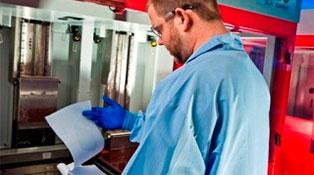September 16, 2015

In the last few years, the 3D printing industry has undergone a massive transformation. It has shifted from an obscure industry, largely found only in research labs, to one that has been catapulted into pop culture and public knowledge. Some have even dubbed it as the next Industrial Revolution.
What’s the byproduct? Hundreds of companies have sprouted up to offer affordable desktop printers, and many envision 3D printers in every home - as common as a microwave or dish washer - standing at the ready to replace lost keys and broken cabinet handles. However, many have found the machines too difficult to operate and maintain and the part quality not up to par with readily available off-the-shelf parts.

Reality has set in that these aspirations are unrealistic, and the status of this next Industrial Revolution is now in question. But hope is not lost. If we thought 3D printing was just a solution for cabinet handles and keys, then we are selling ourselves short on our own ingenuity.
The greatest contribution 3D printing has delivered so far is a powerful tailwind behind design and product development. Across virtually every industry, product developers use 3D printing to build prototypes to test and validate their designs. It not only reduces development time but also the risks and costs as well. Though your phone case is (most likely) not 3D printed, there’s a good chance that 3D printing was utilized in its development. The point is that the revolution is far from dead; it’s just not necessarily being televised. Its presence (and staying power) resides behind the scenes.
The two primary reasons why desktop printers have failed to become truly mainstream are their relatively poor end-part quality and difficult maintenance requirements. By using a 3D printing service bureau the end user does not have to worry about either.
READ MORE ARTICLES ON 3D PRINTING AND ADDITIVE MANUFACTURING:
Also, a service bureau provides a range of technology and material options that would never be possible from a single office printer. Although the printers may not be physically located in the designer’s home or office, the ability to quickly have a physical part built from a digital model very much remains an advantage of a service bureau.
Accessibility to professional-grade 3D printing services levels the playing field between major corporations and entrepreneurs. Technology that would normally be out of reach is now easily accessed online. Individuals and startups can now compete and enter the market faster than ever.
That’s not to say that large corporations cannot reap the benefits of industrial 3D printing. Aerospace companies use 3D printing technology like direct metal laser sintering (DMLS) to functionally test fully dense metal parts before implementing them into production. They are able to design, test, and validate designs for lightweight components, for example, before even buying a single machine for internal production.
3D printing is a powerful tool, but without good design principles, its full potential cannot be unlocked. Weight reduction in manufactured components is becoming increasingly important for companies in the consumer products, medical, automotive, and aerospace industries. Using 3D printing along with other manufacturing methods allows development teams to shrink the number of components in a product design, or choose from different materials that provide the same strength but greater weight savings than current designs.
I will be part of a discussion panel on the state of the 3D printing industry, covering 3D printing’s role in component weight reduction, on Wednesday, Oct. 7 at 10 a.m., at Design & Manufacturing Philadelphia, a Design News event at the Pennsylvania Convention Center. At 11:15 a.m., my colleague Tony Holtz, Proto Labs' technical specialist, will give a presentation on 3D printing part design. We hope to see you there.

Eric Utley is applications specialist for Proto Labs, which provides rapid prototyping, rapid machining, and rapid molding manufacturing services. He has more than five years of experience in rapid prototyping and additive manufacturing, focusing on stereolithography, selective laser sintering, and direct metal laser sintering and design for manufacturability.
About the Author(s)
You May Also Like





